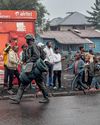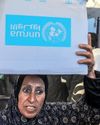
AT THE BEGINNING of September, the discovery that six Israeli hostages had been killed by their Hamas captors as troops operated near the tunnel where they were being held propelled crowds onto the streets of Tel Aviv and other cities.
The focus of the dismay and anger: the government of Benjamin Netanyahu. Israel's main trade union, the Histadrut, called a short-lived but significant strike. Opposition politicians spoke of their dismay at the prime minister's handling of the hostages-for-ceasefire negotiations he has widely been accused of undermining.
Senior military officers and the defence minister, Yoav Gallant, let it be known in private and in public that they preferred a compromise that would prioritise the release of the remaining hostages over Netanyahu's deal-breaking insistence on keeping military control of the Gaza border area with Egypt.
But despite being deeply unpopular outside his own rightwing base, polling at the end of the month for news outlet Maariv revealed that the Likud party of Netanyahu, which many believed could not survive the fallout of Hamas's surprise attack almost a year ago, would win the largest number of seats if elections were called now.
In the aftermath of Israel's killing of Hassan Nasrallah, analysts expected that trend to continue, at least in the short term. A poll for Channel 12 on 29 September-two days after the assassination of the Hezbollah leader - showed another slight improvement in his standing, although at the expense of other parties in his coalition.
Even before Nasrallah's death, Netanyahu's weathering of all storms was surprising, as Israel's war in Gaza drags on, and fighting on fronts from Lebanon to Yemen has sharply escalated.
On the world stage Netanyahu - and Israel by association - has appeared scorned and isolated.
This story is from the October 11, 2024 edition of The Guardian Weekly.
Start your 7-day Magzter GOLD free trial to access thousands of curated premium stories, and 9,000+ magazines and newspapers.
Already a subscriber ? Sign In
This story is from the October 11, 2024 edition of The Guardian Weekly.
Start your 7-day Magzter GOLD free trial to access thousands of curated premium stories, and 9,000+ magazines and newspapers.
Already a subscriber? Sign In

What is DEI and why is Trump waging war against it?
When American voters headed to the ballot box in November, opinion polls suggested the cost of living, immigration and reproductive rights ranked among their biggest concerns.

Who are M23 rebels and why is there fighting in eastern DRC?
The armed group M23 and Rwandan soldiers entered the centre of Goma last Sunday after weeks of advancing on the main city in the Democratic Republic of the Congo's North Kivu province.

Aid distribution What Israel's ban on Unrwa may mean for Palestinians
Israel this week insisted it would not back down over its plan to close the Gaza operations of the United Nations Relief and Works Agency for Palestine Refugees (Unrwa), even though critics said the move would jeopardise urgent humanitarian aid efforts.

Anti-terror strategy failed to stop a killer
Southport attacker's lack of coherent ideology meant the Prevent scheme did not see him as a potential risk, exposing the need for reform
Last writes
Handwriting is disappearing - we are far more likely to use our hands to type or swipe than pick up a pen. But in the process are we in danger of losing cognitive skills, sensory experience and a connection to history?

I just want to hug those girls' Bittersweet joy and relief as freed soldiers return home
Nineteen-year-old Naama Levy became an indelible symbol of Hamas’s 7 October 2023 attack on Israel.

Eighty years after the liberation of Auschwitz, survivors call for courage amid the rise of hatred and antisemitism 'We must avoid the mistakes of the 1930s'
On a day of startling blue skies, Auschwitz survivors stood before princes and presidents on Monday to remind the world, perhaps for the final time, of the horrors they suffered there during one of the darkest moments of human history.

Davos lessons Trump's return heralds new era of harsh global competition
In the heady mountain air of Davos last week, away from the parties and the backslapping tech bros, another, more beleaguered crew touted their wares: the multilateralists.

Can the continent's publishing industry turn a page?
Tsitsi Dangarembga's Nervous Conditions, a novel about growing up in colonial Zimbabwe, is one of the most important works of 20th-century African literature and features on university curriculums across the UK.

Trump has arrived with abang-but can he follow through?
Little more than a week ago, Stewart Rhodes was serving an 18-year prison sentence for seditious conspiracy over his role in a deadly attack on the US Capitol.